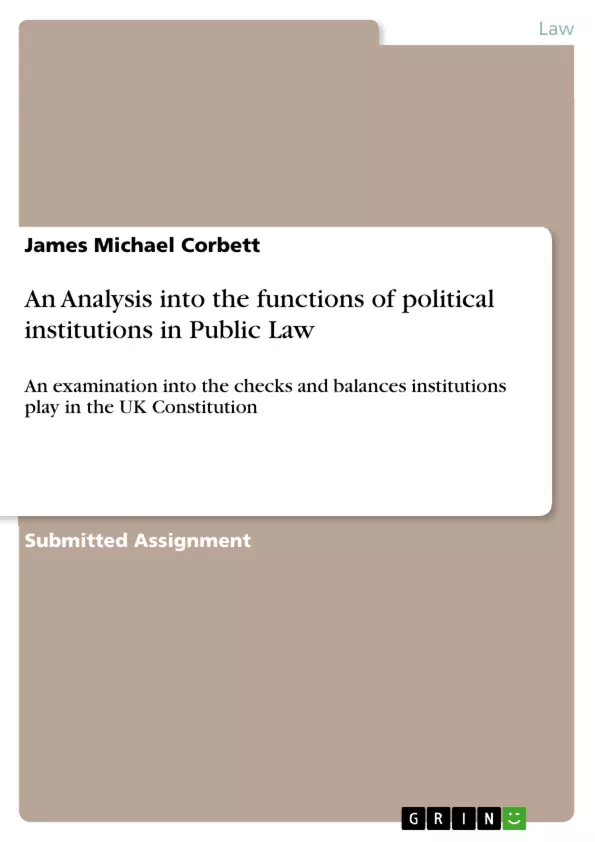How do political institutions shape democracy? What keeps power in check—and what happens when those checks fail?
In every democratic society, the design and performance of political institutions determine how power is exercised, limited, and made accountable. This study offers a comprehensive exploration of institutional theory within the context of the United Kingdom’s constitutional framework.
Drawing on both classical political thought—from Plato, Aristotle, Locke, and Montesquieu—to contemporary institutional analysis and rational choice theory, James Michael Corbett examines how the legislature, executive, and judiciary interact to uphold the rule of law and prevent the concentration of power. His assignment traces the enduring questions that define public law: Who makes the rules, who enforces them, and who ensures justice when power is abused?
Blending legal insight with political reasoning, the author invites readers to rethink the machinery of democracy and the principles that sustain it.
A valuable contribution for scholars of public law, political science, and constitutional studies—and for anyone interested in the dynamics of power in democratic societies.
1 Institutional Variation Among Western Capitalist Democracies
2 Institutions in Political Theory
3 Forgetting and Rediscovering Political Institutions
4. Issues in Contemporary Institutional Analysis
5 Political Institutions
6 What Do Political Institutions Do?
7 Institutional Analysis and the Future of Political Science
References
UK Public College
Postgraduate Diploma in Public Law
An Analysis into the functions of political institutions in
Public Law
An examination into the checks and
balances institutions play in the
UK Constitution
James Michael Corbett
Contents
1 Institutional Variation Among Western Capitalist Democracies
2 Institutions in Political Theory
3 Forgetting and Rediscovering Political Institutions
Political Institutions Rediscovered
4. Issues in Contemporary Institutional Analysis
5 Please Explain Political Institutions
6 What Do Political Institutions Do?
UK Political systems three branches of government
Visible overlaps within the three branches of government
7 Institutional Analysis and the Future of Political Science
1 Institutional Variation Among Western Capitalist Democracies
The basic understanding of the origins of any kind of formalised political power come in two different variants. The first, is the "good" or "democratic" or "community-based" type and embodies the following. A group of people share some common characteristics. They live in the same area, for example, or they work at the same place, or they are dependent on the same type of natural resources. In their daily lives, they soon discover that they not only have individual interests but also a number of common interests. As a geographical community, they realise a common need for laws regulating conflicts about property and other types of individual rights, and for the effective enforcement of such laws. They discover a need for an organisation to pursue their common interests of better wages and working conditions, or a need to regulate use of natural resources to avoid "the tragedy of the commons” (Hardin 1982; Ostrom 1990). So, they get together as equals and form an organisation to solve their collective interests, which is to say, they form a government. Or, per the other two examples, they establish a union or an economic co-operative of some kind-which from this perspective are to be seen as just different sorts of governments.
In all three cases, the members of the community soon discover that, in order to pursue their common interests, they need four basic types of political institutions. One type of institution is needed for making collectively binding decisions about how to regulate the common interests (a rule-making institution). A second institution is needed for implementing these decisions (rule-applying institutions). A third institution is needed for taking care of individual disputes about how to interpret the general rules laid down by the first institution in particular cases (rule-adjudicating institutions). A fourth institution is needed to take care of and punish rule-breakers, whether outsiders or insiders (rule-enforcing institutions).
What we see in the real world is an enormous variation, over time and place, in the specifics of these institutions. We do not only get democratic and undemocratic political institutions. In both cases there exists a great variation in the specific form of institutions. This is readily seen from the fact that, although Italian fascism and German Nazism shared many ideological features, they were remarkably different in their institutional sct-up (Payne 1990). Despite the fact that they share a common basic structure, economically and politically, there is a great variation in political institutions.
So for example, in looking at Institutional Variation Among Western Capitalist Democracies there is a Party-system as in a two-party vs. multi-party system as compared with an Electoral system, a Proportional vs. Majoritarian system. Government structure as in Unitarian or federalist (The UK is a Unitary State). Central authority as in Parliamentary or presidentialism (The UK adopts a Parliamentary system). State-economy relation as in Liberal or corporatist. The UK is a constitutional Monarchy. The court system as in Judicial review vs. judicial preview. The UK adopts a system of judicial review meaning that if a citizen has a claim against the state they can take their case to the local authority in judicial review proceedings.
Political scientists look at why institutional differences occur. More specifically, they ask three different but interrelated questions about political institutions, one is normative: Which institutions are best suited for creating "good" government and societal relations. The other two are empirical: what explains the enormous variation in institutional arrangements? And what difference do those differences make for political behaviour, political power and the outcome of the political process?
- Quote paper
- James Michael Corbett (Author), 2024, An Analysis into the functions of political institutions in Public Law, Munich, GRIN Verlag, https://www.grin.com/document/1572559



